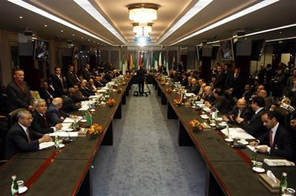OPEC leaves crude output targets unchanged
VIENNA: OPEC is leaving its production quotas unchanged, opting to take a cautious approach in a market awash in crude and a global economy still in the early stages of recovery.
The 12-nation Organization of Petroleum Exporting Countries early Thursday said "market fundamentals have remained weak," even though current oil prices at about $71 are roughly double their level since December, when the group announced a record 4.2 million barrel per day cut from September 2008 levels.
The meeting's closing communique said "whilst there are signs that economic recovery is under way, there remains great concern about the magnitude and pace of this recovery," especially in the West. The group noted uncomfortably high crude and refined product levels, which reflect that refiners are not eager to churn out additional product.
"Since the market remains oversupplied and given the downside risks associated with the extremely fragile recovery, (OPEC) once again agreed to leave current production levels unchanged for the time being," the statement said.
The upswing in prices was a blessing for the bloc supplier of roughly 35 percent of the world's crude but OPEC ministers noted volatility remained in the market and a delicate touch was needed to ensure that the uptick does not derail global economic recovery efforts.
The decision, announced in the early hours of Thursday, came as little surprise, confirming earlier predictions by the group's oil chiefs.
But analysts said it also reflected a shift in policy for the group.
Whereas earlier this decade, OPEC "would have moved proactively, this time they chose not to," said David Kirsch of Washington-based consultancy PFC Energy. "The ministers all acknowledged downside risks to both demand and prices."
OPEC "is really hoping that the economy turns around and takes care of the current overhang in distillates somewhat naturally" instead of them intervening directly, he said.
The group — excluding Iraq — has set a production target of slightly under 25 million barrels per day, but has been overshooting that mark by about 1 million barrels per day, according to analysts.
The increase in inventories is a major challenge for OPEC, especially as the U.S. driving season winds down and refiners gear up for the winter heating-oil season with refined product inventories also high.
"When we look at fundamentals, we see this overhang with great concern," OPEC Secretary General Abdulla Salem el-Badri said.
While the group was optimistic that the global recovery would help mop up the excess oil, el-Badri also took notice of the compliance issue, saying that "of course, when the conference takes a decision, we would like our members to adhere to the decision."
But he also stressed that the group was not ready to jeopardize the economic recovery efforts by pushing for steep cuts.
"We are working on a very thin line," he said. "We have to be very careful. We don't want to take action that will jeopardize the recovery."
For the better part of a year, volatility in prices has been the norm as supply and demand fundamentals were often overshadowed by investors using crude as a hedge against fluctuations in the dollar.
The group's president, Angolan Oil Minister Jose Botelho de Vasoncelos, said while members were satisfied with current price levels, rampant speculation is still buffeting crude markets.
"We are concerned about the continuing price volatility, which once again is happening when there is plenty of crude in the market," Botelho de Vasoncelos said, at the meeting's opening.
With no control over currency fluctuations or crude demand, OPEC members could focus only on the one factor within their grasp supply.
But the strong compliance with quotas has waned over the past four months, dropping to between 68 and 70 percent, according to el-Badri. That erosion came in tandem with rising prices as some members starved for hard currency upped production to generate more revenue.
In doing so, however, they not only risked credibility, but also could open the door for undermining the price of a commodity most in the bloc rely on for their livelihood and economic growth.
While Saudi Arabia had repeatedly indicated earlier that $75 per barrel was a fair price for both consumers and producers, other members have begun to raise the threshold.
Kuwait's Al Sabah said $80 per barrel was fair, and Iran's new oil minister, Masoud Mirkazemi, said that "what is good is the price that will give us a good incentive for more investment."
"At the current value of the dollar, and the fact that the dollar depreciated, it is questionable if that is the right price," he said, referring to the $70 per barrel threshold. "I think it has to go up given the fact that the dollar has depreciated so much."
But PFC Energy's Kirsch said the comments come in the broader context of a long-term sustainable price, versus a day-to-day level, which el-Badri said has averaged about $54 per barrel for the group so far this year.
"There is a recognition that you don't get that (sustainable price) without a healthy economy," said Kirsch. "And you have to put the healthy economy first."






